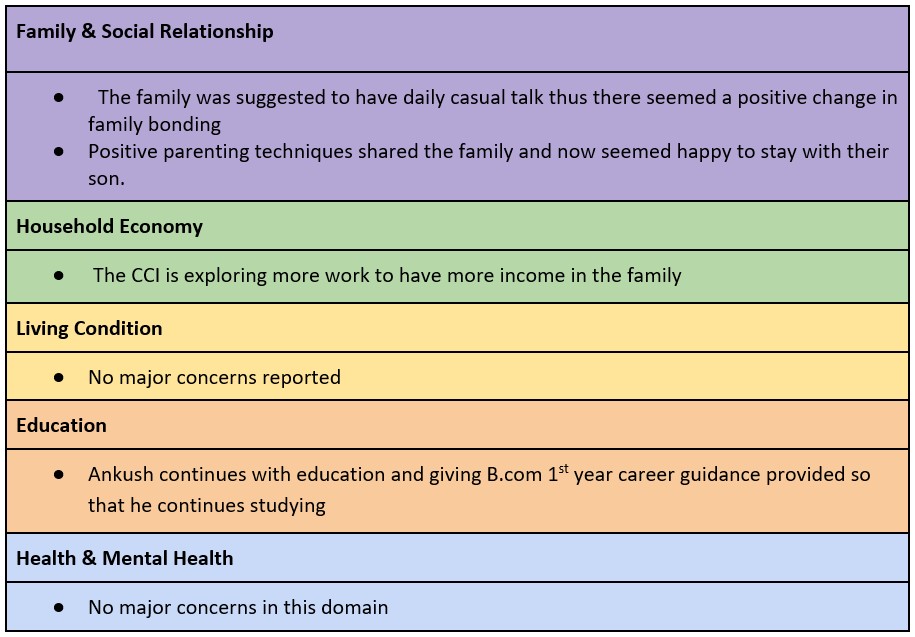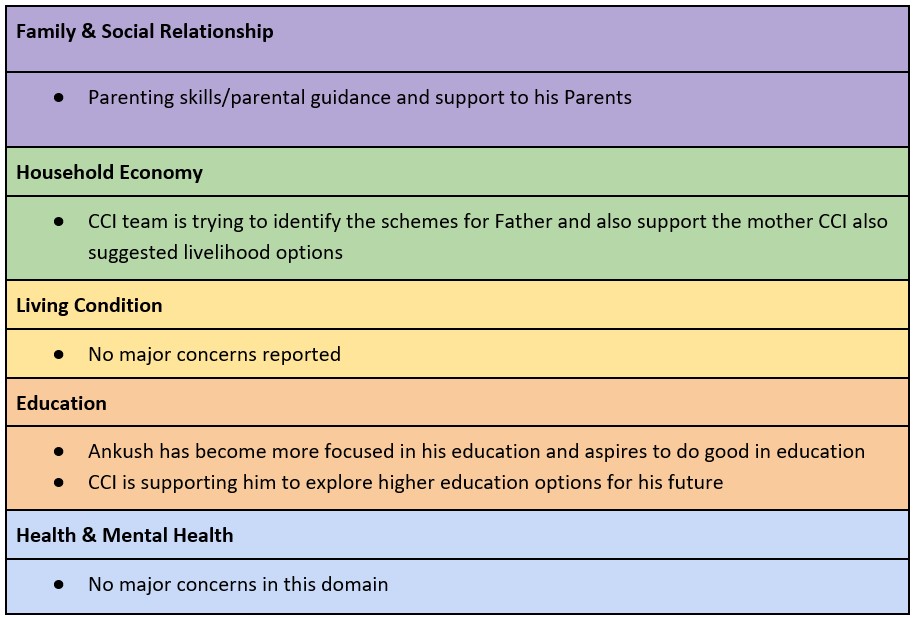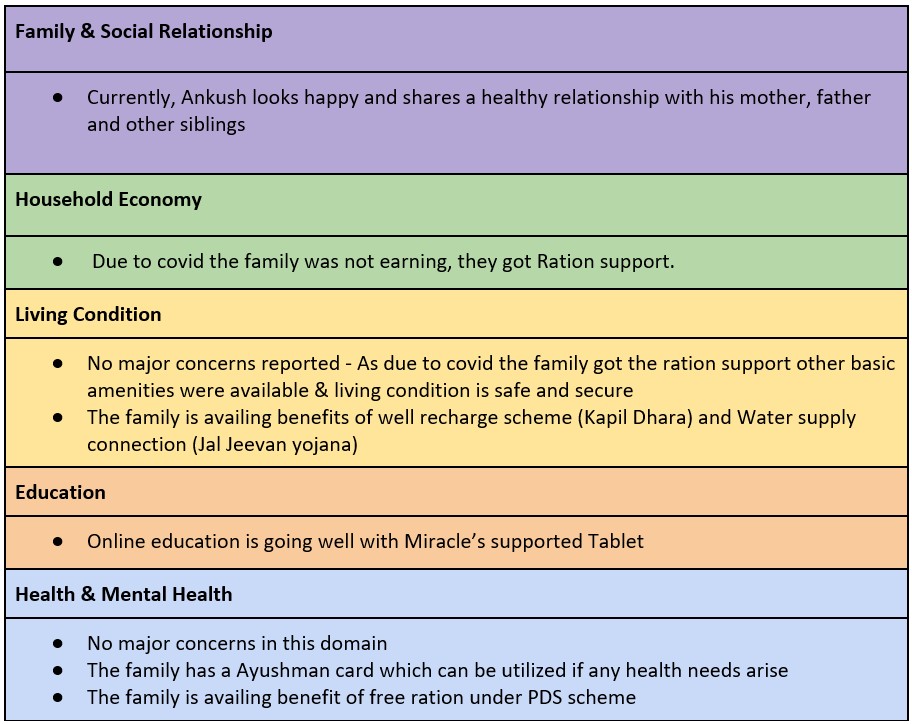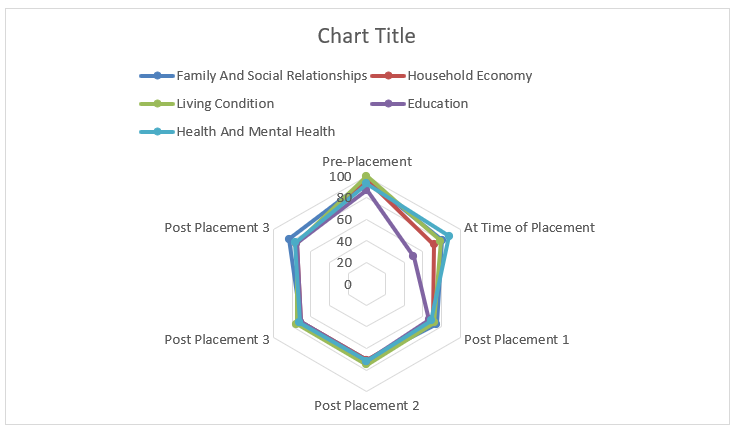Ankush Patel (name changed to protect identity) is a 20 year old boy, now happily settled with his parents. Pursuing a Bachelor’s in Arts (final year) from a reputed college at Sendhwa — the Government PG College — Ankush aims to become an accountant in the future. He is a sensitive and sincere person, looking to build a career and be independent. Ankush moved out of the Child Care Institute (CCI) three years ago to try and set himself up as a responsible member of society.
Ankush was admitted to CCI at the age of 10 years when his father and mother were facing a severe financial crisis. Looking at the condition of his family at the time, a local social worker from his village had admitted him to the CCI.
The assessment stage
Ankush’s transition planning started when he was in the 12th Grade. We engaged in a dialogue with his father in February 2018 (during a parents’ meeting at the CCI) to get to know him and his thoughts and future plans for Ankush. Initially, he was not willing to reunite with the child, mainly because he thought Ankush’s education would be disrupted. “His main concern at that stage was, ‘Who will guide the child in his studies once he is back home?’” Recalls the social worker in charge. “When we spoke to Ankush himself, he too said that he would prefer to continue his education and remain at the Child Care Institution (CCI). He feared that the environment at home would not be conducive to his education.”
However, with gradually built up dialogues and frequent connects between father and son, the CCI team settled all their apprehensions. Both father and son then showed a willingness to reunite. The social worker continued to prepare and update the Individual Care Plan of the child. Both the child and family assessments were positive and favoured the child’s reintegration. The Thrive ScaleTM highlighted the strengths of the family: they wanted to live under one roof, with the child.
In 2018, the CCI team conducted a home visit at Ankush’s home to explore the possibility of reintegration with the birth family. The findings of the home-visit were captured in the Social Investigation Report (SIR). Some key findings included:
- When the child decided to stay on in the CCI, his father was not supportive of the idea. Gradually he started considering reuniting with the child, at the same time also giving due consideration to child’s education and future career prospects.
- His father has been mentally prepared to care for an adolescent boy. The psychologist worked to impart parenting, positive disciplining and other necessary skills to him.
After a successful SIR, the planning phase began which is essentially preparation work to ensure a smooth transition. This involved:
- Individual Counselling sessions by the social worker and the mental health resource person for future adjustment issues, continuation of education and career guidance.
- Family counselling sessions with his parents, mostly focusing on parenting skills and relationship building.
- Mental preparation of the child by the visiting psychologist at the CCI as well as by the CCI team.
- Individual counselling sessions with Ankush that focussed on helping him understand the new opportunities and challenges that the changes with living at his own home and life in society may bring for him. The counselling sessions helped the child become more confident and have better interpersonal skills.
- Life Book Work Sessions (a therapeutic tool) were conducted on developing soft skills like expressing emotions, family life and wishes, dreams and aspirations
- Priority LSE Units with Ankush worked on adolescent skills such as financial management, interview skills, empathy, emotional management and responsible sexual behaviour
- At the same time, the social worker continued to do the ICP Part B with the child
- Ankush understood how important education is, with the support from the team
After the preparation, the child was moved to his home in Sendhwa in 2018.
(It may be noted that when this child and his family were assessed right upto the time when the child was reintegrated, our Thrive ScaleTM had not been developed. Back then, it was in the form of two tools [Placement Plan and Risk Assessment] only. The Thrive ScaleTM tool was launched in March 2021. This is when the data for this child and family was transferred from the old tools to the new one.)
On 17th June 2019, the Thrive ScaleTM assessment was conducted which focused on five wellbeing domains: Physical & Mental Health, Education, Family & Social Relationships, Home Finances and Living Conditions. A baseline score was generated based on the needs assessed in each domain while also ensuring realistic implementation plans. Here are some key findings from the Baseline Thrive ScaleTM under various domains:

Monitoring, Follow up and Support Stage
On 30th July 2019 (1st Post Placement) Thrive ScaleTM assessment was completed. The in-person visit was conducted at his village home. The major findings were:

On 4th October 2019 (2nd Post Placement) the Thrive ScaleTM assessment was completed in person ensuring parental support and relationship bonding with the family as these areas seemed to have a gap. Here are some key findings from Thrive ScaleTM under various domains:

On 27th September 2020 (3rd Post Placement) the Thrive ScaleTM assessment was completed remotely due to the Covid lockdown to address parenting issues, educational guidance and offer better insights on deepening the family bond. Here are some of the key findings:

Weekly/fortnightly follow-ups continued with the family to support them with identified issues.
On 2nd January 2021 (4th Post Placement) the Thrive ScaleTM assessment was completed following a home visit where the things were now well and the family was found to be living happily together. Here are some key findings:

Current situation: Ankush continues to stay with parents, and has a bond with both brothers. He is attending college regularly and is in B. Com final year now.
Follow ups: Fortnightly/monthly telephone follow ups continue.
Tabular & Graphical representation of Thrive ScaleTM scores over time:

Note: Since previous assessments were conducted using the old tool, the scores are at the higher end. The later, more recent assessments were conducted in the new Thrive ScaleTM tool and depict more realistic scores.

